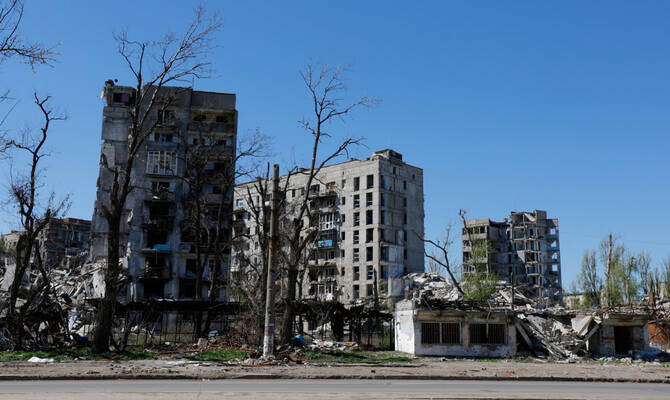KRAMATORSK, Ukraine: Ukraine’s Volodymyr Zelensky said Saturday his forces would observe a surprise Easter truce announced by Russian President Vladimir Putin set to last until midnight on Sunday, even as air-raid sirens sounded in Kyiv.
The 30-hour truce would be the most significant pause in the fighting throughout the three-year conflict.
But just hours after the order was meant to have come into effect, air-raid sirens sounded in the Ukrainian capital and Zelensky accused Russia of having maintained its artillery fire and assaults on the frontline.
Also on Saturday, Russia and Ukraine held a large exchange of prisoners, each side saying they had handed back more than 240 captured fighters.
The order to halt all combat over the Easter weekend came after months of efforts by US President Donald Trump to get Moscow and Kyiv to agree a ceasefire. On Friday, Washington even threatened to withdraw from talks if no progress was made.
“Today from 1800 (1500 GMT Saturday) to midnight Sunday (2100 GMT Sunday), the Russian side announces an Easter truce,” Putin said in televised comments during a meeting with the Russian chief of the general staff Valery Gerasimov.
Zelensky responded by saying Ukraine would follow suit, and proposed extending the truce beyond Sunday. But the Ukrainian leader also accused Russia of having already broken its promises.
Air-raid sirens sounded in Kyiv and several other regions on Saturday evening.
“Russian assault operations continue on several frontline sectors, and Russian artillery fire has not subsided,” Zelensky said.
Putin had said the truce for the Easter holiday celebrated on Sunday was motivated by “humanitarian reasons.”
While he expected Ukraine to comply, he said that Russian troops “must be ready to resist possible breaches of the truce and provocations by the enemy.”
Zelensky in a social media post wrote: “If Russia is now suddenly ready to truly engage in a format of full and unconditional silence, Ukraine will act accordingly — mirroring Russia’s actions.”
He added: “If a complete ceasefire truly takes hold, Ukraine proposes extending it beyond the Easter day of April 20.”
He proposed that “30 days could give peace a chance,” while pointing out that Putin had earlier rejected a proposed 30-day full and unconditional ceasefire.
“The fighting is ongoing, and Russian attacks continue,” Ukraine’s military command, the Chief of Staff, reported Saturday evening.
“In some areas on the frontline, Russian artillery continues to be heard, despite the promise of silence from the Russian leader. Russian drones are being used. It is quieter in some areas.”
Soldiers in the eastern Ukrainian city of Kramatorsk close to the front line earlier greeted the truce announcement with skepticism.
Putin “might do it to give some hope or to show his humanity,” said Dmitry, a 40-year-old soldier. “But either way, of course, we don’t trust (Russia).”
Putin said the latest truce proposal would show “how sincere is the Kyiv’s regime’s readiness, its desire and ability to observe agreements and participate in a process of peace talks.”
Russia launched its full-scale invasion of neighboring Ukraine in February 2022.
Previous attempts at holding ceasefires for Easter in April 2022 and Orthodox Christmas in January 2023 were not implemented after both sides failed to agree on them.
“For millions of Ukrainians, Easter is one of the most important holidays. And millions of Ukrainians will go to church,” said Zelensky in his evening address.
“Over the years of this full-scale war, Russian attacks have destroyed or damaged more than 600 churches, prayer houses and places of worship.”
In Kramatorsk, one soldier, Vladislav, 22, said: “I feel like it’s going to start again after a while, and it’s going to go on and on.”
On the streets of Moscow, Yevgeny Pavlov, 58, said he did not think Russia should give Ukraine a breather.
“There is no need to give them respite. If we press, it means we should press to the end,” he told AFP.
Earlier Saturday, Ukraine and Russia said they had each returned 246 soldiers being held as prisoners of war in a swap mediated by the United Arab Emirates.
Zelensky said the total number of returned POWs now stood at 4,552.
The UAE’s foreign ministry said 31 wounded Ukrainians and 15 wounded Russians were also exchanged.
The UAE said it was committed to “finding a peaceful solution” to the conflict and “mitigating the humanitarian impacts.”
Russia said it had retaken the penultimate village still under Ukrainian control in its Kursk frontier region.
Kyiv had hoped to use its hold on the region as a bargaining chip in the talks.

























